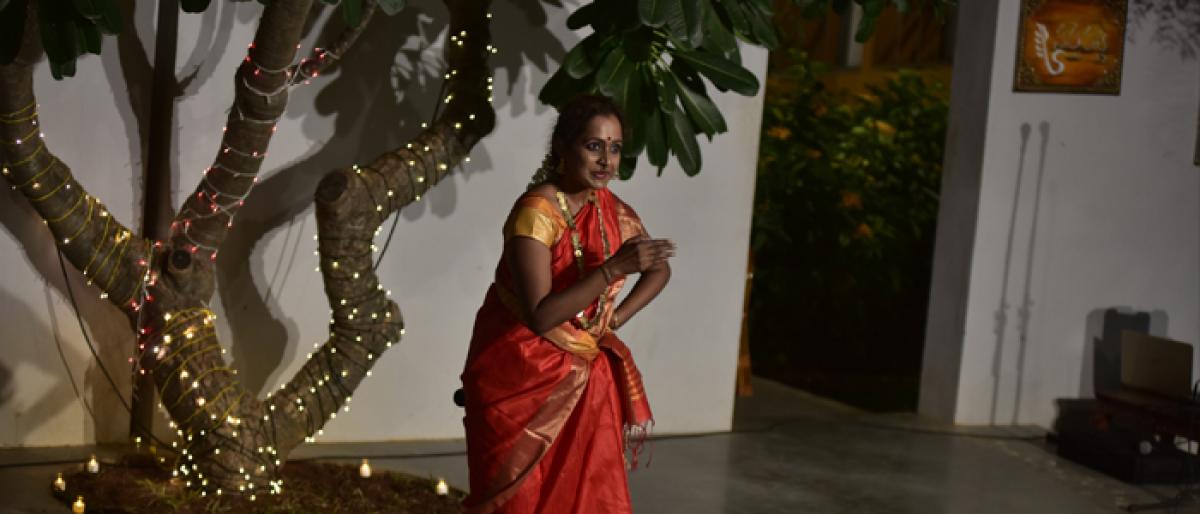Live
- Nominations for Prime Minister’s ‘Yoga Awards 2025’ now open
- J&K: Brief exchange of fire along LoC in Poonch sector
- TPCC Defends Revanth Reddy’s Remarks on PM Modi’s Caste, Hits Back at BJP
- KTR Accuses Congress Government of Neglecting Gurukuls, Claims Institutional Collapse
- Progress of country, tribals are inter-linked: President Murmu
- FIH Women’s Pro League: England thwart India fightback, win bonus point in shootout
- Metro Railway Kolkata to evacuate stranded rakes from tunnels using battery power
- Controversy Over Congress President’s Remarks on Maha Kumbh Mela
- CM Urges H.D. Deve Gowda to Stand Above Politics for Karnataka’s Water Rights
- Unseeded Kyrian Jacquet upsets second seed Billy Harris to win Delhi Open 2025 singles title
Just In

Javalis, the lively short pieces of verse teeming with poetic imagery, love and devotion for Lord Krishna are a regular feature in classical dance performances Interesting most of the Javalis are written for the kalavantulu or the Devadasis also known as Sani, who are dedicated to the main deity at the temples
Javalis, the lively short pieces of verse teeming with poetic imagery, love and devotion for Lord Krishna are a regular feature in classical dance performances. Interesting most of the Javalis are written for the kalavantulu or the Devadasis (also known as Sani), who are dedicated to the main deity at the temples, and they pray to the God, whom they believe to be married to through dance and songs and spent their time in the service of God. They were the propagators of Javalis, which they may have learnt from their mother, aunt. It was mostly oral tradition so much so that many hundreds of Javalis are known to have faded away into obscurity after the Devadasi Abolition Act came into
being.
Before they were refrained by the law, the Samsthanams, the courts of the Zamindars would be entertained by the Sani or the Devadasis with their song and dance. The courtesans in addition to their worship of God and dancing for the temple Utsavams also helped the women by assisting them to take care of the kids, etc. They also performed at the courts and the Javalis and padams filled with erotic mysticism would be part of their repertoire.
Kuchipudi dancer and courtesan dance exponent Yashoda Thakore has been reviving the long forgotten Javalis and performing them from time to time. Her group Natyasamhraha and Vrinda Saranya recently published a book of Javalis.
The genesis of this book is a handwritten notebook with notations that a Devadasi Gaddibhukta Sitaram gave to VAK Ranga Rao, the much-accomplished film critic, art, music and dance critic. Ranga Rao, the decedent of Bobbili Samsthanam to which Sitaram was brought to service Bobbili Venugopala Swamy, shared his memories of her, “I remembered her making us sit in front of her as she told stores. I saw her dance outside the temple during Uregimpu (procession). She wouldn’t perform in front of us children, but when she related stories she would do it with abhinaya that would enamour me. Even when she went away to live her life, she continued to be generous and helpful to people. Before she died she wanted to know if I could restore temple dances. She handed over this book that contained Javalis handwritten by her complete with notations.”
Yashoda helped publish the book and noted musician Dr Vyzarsu Balasubramaniam tuned the compositions, sang a few and recorded a CD that comes along with the book. The launch of the book in Hyderabad also saw Yashoda perform the Javalis that enamoured the audience with enchanting lyrics accentuated by the exemplary abhinaya.
The Javalis traverse a variety of emotions of togetherness, separation…In one such verse, the nayika says “It was you who held my hand when I was young and said you will never leave me, now you cheated me, where do I go from here”. Yashoda also performed a padam that chides the lover thus: "You are already so tired, haven't you had enough? Why don't you come back another day? I'm always here for you. Go, regain your energy and come back...look at you, you're shivering, why don’t you take a break.” Yashoda performs this in the ‘Mezuvani’ style, which is done in a sitting position, and the dancer uses her abhinaya skills to engage the audience. One has seen Yashoda doing Mezuvani pieces on stage, but the intimate setting of the performing space Saptaparni brought forth its true essence.
The performance ended with a Gaptu Varasa that filled our hearts with joy. VAK Ranga Rao explains the importance, “I do not think many would know a Gaptu Varasa. It is a compulsory part of the courtesan dance. It is like the extempore that the performers of a Carnatic music concert conjure up towards the end of the programme. It is lively and is a dance performed to the violin and mridangam without any prior preparation. That gives it the beauty of the moment.” The event left one wondering why Telugu land has been so callous in letting our rich culture bite the dust and fade into oblivion. While this book of Javalis did see the light of the day, there are scores of others that are lost forever.

© 2025 Hyderabad Media House Limited/The Hans India. All rights reserved. Powered by hocalwire.com







